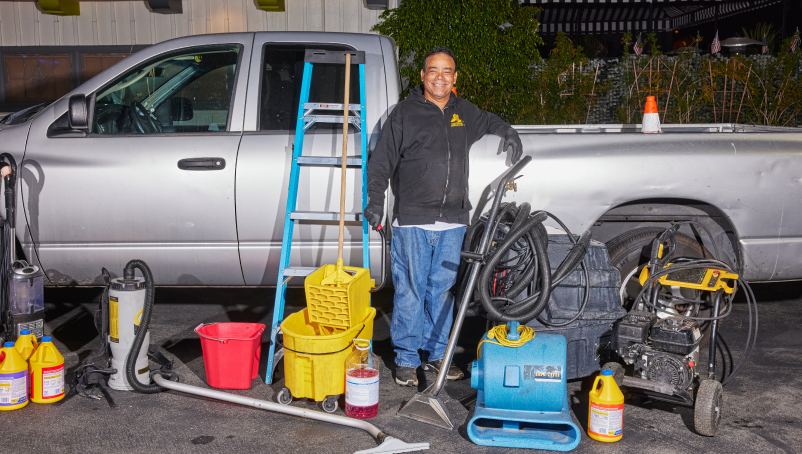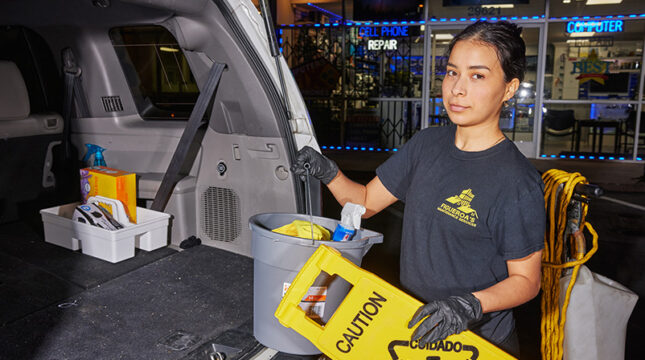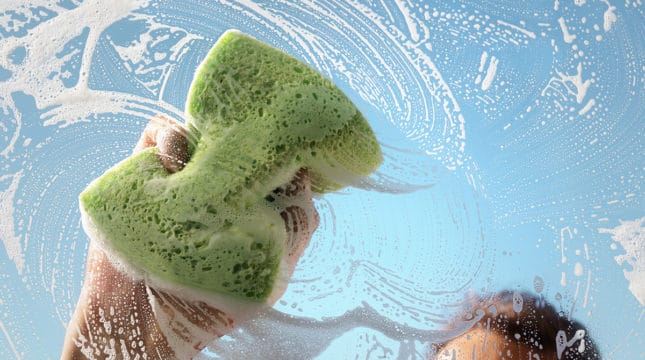1. Write off licensing and permits
Licensing and permits are essential for staying compliant as self-employed individuals and small business owners. Many states or cities may require cleaning businesses to hold specific licenses, primarily if they use commercial-grade cleaning products or handle specific tasks. The cost of obtaining and renewing these authorizations is deductible, helping to offset this business expense.
If you work in multiple locations, check the requirements in each area, as regulations can vary. Some municipalities also require specific permits for businesses operating in residential areas, especially if your work involves handling chemicals or specialized equipment.
2. Track receipts from cleaning supplies and materials
Supplies and equipment are essential to your business — and they’re deductible. You can claim expenses for cleaning products and equipment, from disinfectants and sprays to brooms and mops. If you replace items frequently, track each purchase to ensure accurate deductions.
Safety is essential for both cleaners and their clients, so related cleaning supplies can be tax-deductible. Items like gloves, masks, hand sanitizers and any specialized protective gear fall under deductible business expenses, as they’re necessary for a safe work environment.
Additionally, if a homeowner or other client requests certain safety measures — like eco-friendly or hypoallergenic products — those supplies are also deductible, helping you maintain a professional and health-conscious house cleaning service.
3. Tax-deductible insurance premiums for your cleaning business
Besides being a valuable investment that helps protect you and your business from financial losses, cleaners insurance is a valuable tax deduction for any cleaning business.
General liability insurance for cleaners is one of the most important types to consider; it helps safeguard you in case of accidental damage to a client’s property, such as spills on carpets or scratches on surfaces. It also helps protect against claims for non-employee bodily injuries. Premiums for liability insurance are deductible as business expenses, reducing your taxable income.
If you hire employees, workers’ compensation insurance becomes essential and often mandatory. It helps cover costs if an employee gets injured on the job and protects you from paying medical expenses, lost wages and more out of your own pocket. Premiums for workers’ comp insurance are also deductible, making it easier to manage this required expense.
For your health needs, the self-employed health insurance deduction may let you deduct medical, dental, and even long-term care insurance premiums if you meet IRS qualifications. This deduction applies even if you don’t itemize other deductions and helps lower taxable income.
Keeping detailed records of all annual insurance-related expenses will simplify claiming these deductions when tax season arrives.
4. Equipment and repair tax credits
Larger equipment like vacuums, floor polishers, steam cleaners and carpet cleaners used exclusively for business also count, as do any repairs or maintenance costs to keep them in good working order.
You can also claim depreciation on some of your more expensive, valuable equipment, letting you spread the deductions over its lifetime. The IRS allows different methods for calculating depreciation, so it’s worth consulting with a tax professional or certified public accountant (CPA) to determine the best approach for your business needs. Tracking each item’s purchase dates and costs is key to accurately claiming these write-offs.
5. Vehicle and travel expense deductions
Transportation and travel are significant expenses for on-the-go cleaners. If you drive to clients’ homes, you can deduct either the standard mileage rate (set by the IRS each year) or your actual expenses, such as gas, maintenance, and depreciation.
If you use the actual expense method, additional costs like car insurance, repairs and lease payments may be partially deductible. You can also claim deductions for parking fees and tolls directly related to client visits.
A mileage tracking app can make it easier to log your trips accurately and separate personal trips from business use.
Learn more: Mileage tax deduction for small business: How to calculate and deduct
6. Uniforms and laundry can be tax-deductible
Uniforms and laundry can be valid self-employed cleaner tax deductions, but they come with specific guidelines.
If you wear designated clothing solely for work, such as branded shirts or specialized protective gear, you may deduct the cost of purchasing these items. The key is that the attire must be required for work and not suitable for everyday wear. Casual clothing, even if worn exclusively for cleaning, does not qualify.
Similarly, laundry expenses for cleaning work-specific attire may also be deductible. If you regularly wash uniforms or other required gear, track your laundry costs or the portion of your laundry expenses directly tied to work clothing.
7. Marketing and advertising costs
Promotions are essential for growing your cleaning business, and related expenses are fully deductible. Costs for business cards, flyers, fees for online ads or sponsored social media posts qualify as deductible expenses. Even small investments, like branded car decals or custom apparel with your cleaning company’s logo, can help increase your visibility and are deductible.
If you have a website, expenses for domain registration, hosting fees and any paid digital marketing services also qualify. Tracking your marketing expenses will make it easy to claim them at tax time and maximize your investment in growing your business.
8. Home office expenses
The home office deduction is available to cleaners with a dedicated workspace at home to manage their cleaning business. To qualify for the home office deduction, your workspace must be used solely for business purposes and as the primary business hub.
The IRS offers two methods for calculating this deduction: the simplified method, which is based on square footage, and the actual expense method, which calculates a portion of home expenses based on the percentage of the home used for business.
Office supplies like pens, paper, and printer ink are also deductible. Shared utilities like internet, cell phone and electricity can be partially deducted if used for business purposes. Keeping accurate records and calculating percentages is crucial for claiming the correct tax write-offs.
9. Technology and software can get tax credits
While cleaning homes is a primarily physical business, don’t forget the administrative side. Technology and software are often deductible.
For example, a self-employed house cleaner tax deduction might be scheduling or booking software because it makes managing client appointments easy. Accounting software helps with invoicing, tracking necessary expenses and preparing tax returns. Regardless of whether you paid outright for the software or subscribed to a monthly or annual fee — it’s deductible.
10. Professional services write offs
Legal and financial services are important resources for self-employed cleaners and can be fully tax-deductible. Costs associated with hiring a tax preparer, accountant or bookkeeper to manage your finances, do payroll and ensure compliance can reduce your taxable income. Similarly, legal fees, such as those for setting up a business structure or drafting contracts, are also deductible if directly related to your cleaning business.





